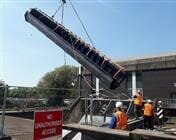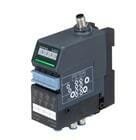ECS Engineering Services has completed the modernisation of Shieldhall, Glasgow’s largest wastewater treatment works, including the installation of 14 massive new screw pumps, without disruption to normal operations.
The project was part of Scottish Water’s £250m, multi-phase programme to improve wastewater and sewage treatment across the whole Glasgow area. The aim was to ensure that Shieldhall is able to cope not only with current demands but is also ready for future growth in the local population.
ECS Engineering Services regularly works with Scottish Water on projects of all sizes. The scale of the Shieldhall modernisation meant that it had to be planned carefully so that wastewater treatment could continue 24 hours a day for the duration of the project.
The initial driver for the project was the realisation that the 14 large Archimedes screw pumps, upon which the whole treatment process depends, were getting towards the end of their service lives and needed replacing.
Four pumps are used to control the inlet flow, while another six are used in the high-level area where pre-sedimentation processes are carried out. These 10 pumps are all identical, each capable of pumping 960 litres of foul water per second. They are 16 m long, 2.4 m in diameter and weigh 13 tonnes each, so removing the old screws and craning the new ones into position was a major undertaking in itself. Fortunately, this could be done quickly and efficiently because many of ECS’s engineers are qualified to manage crane operations, so there was no need to bring in specialist contractors.
The original plan had been that the new pumps would be identical to the old ones. However, ECS realised that would have involved taking several weeks to rebuild the concrete troughs in which the screws operate. Further, this could have caused potential problems for personnel as space restrictions would make work difficult and dangerous gases could be present.
Instead, ECS worked with its partner company Landustrie in the Netherlands to develop an alternative idea. The solution they agreed with Scottish Water was to make new troughs out of coated steel, which could be moved into position below the screws very easily and then backfilled with concrete. The end result was not only a faster and safer installation but also a final solution that was measurably stronger and more durable than the previous one.
ECS also asked Landustrie to incorporate stainless steel, sealed-for-life bottom bearings in the pumps. These have a very long life expectancy and are completely maintenance-free.
The four remaining pumps on the final stage are even larger, having a screw diameter of 2.6 m and a flow rate of up to 1580 litres per second. They drive the vital return activated sludge (RAS) process, which recycles part-processed water through the aeration tanks where microorganisms segregate wastes from water to facilitate their decomposition and ensure complete treatment.
The scope of the project also included replacement of the pump drives, which consist of large motors and separate gearboxes designed to step down the motors’ output speed to that of the required pump speed. As per Scottish Water’s specification, the motors are set up in a direct-on-line configuration and drive the pumps through a v-belt and gearbox. This simple but efficient arrangement is appropriate because the slowly rotating pumps run continuously so there are no recurring start-up impulses or shock loadings.
Importantly, the new motors installed by ECS are very high efficiency, which, because of their 24 hours per day operation and decades-long working life expectancy, will save a considerable amount of energy. This will both cut carbon emissions and reduce running costs.
The Shieldhall treatment works was originally built in 1910 and has been regularly upgraded and modernised, including a major rebuild in 1980. Today, it serves most of the 600,000 people living in central Glasgow. ECS has ensured that the Shieldhall wastewater treatment works is set to serve Glasgow and its visitors for many years to come and that it is reliable, low cost, environmentally friendly future.








